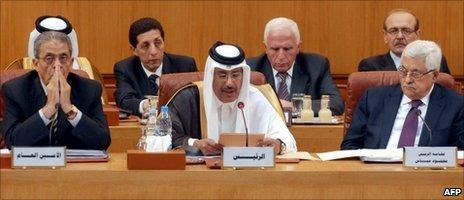Arabs reject Middle East peace talks without US plan
- Published

Arab foreign ministers have rejected further Palestinian-Israeli peace talks without a "serious offer" from the US on ending the Middle East conflict.
They announced their decision following a briefing from Palestinian leader Mahmoud Abbas at a meeting in Cairo.
Direct talks collapsed this month over Israel's refusal to stop building settlements in the occupied West Bank.
The Arab League ministers said they would seek a UN Security Council resolution against settlement building.
"Resuming the negotiations will be conditioned on receiving a serious offer that guarantees an end to the Arab-Israeli conflict," the ministers said in a statement read by Arab League chief Amr Moussa.
The group follow-up committee on the Middle East peace process "sees that the direction of talks has become ineffective and it has decided against the resumption of negotiations", Mr Moussa said.
The ministers also decided "to bring up the issue of Israeli settlements again to the Security Council", wanting the UN body to adopt a resolution "that confirms... the illegal nature of this activity and that would oblige Israel to stop it".
They called on the US, which has vetoed resolutions against Israel in the past, not to obstruct such a move.
Settlements are considered illegal under international law, although Israel disputes this.
US plan
Earlier on Wednesday, US Middle East envoy George Mitchell promised "substantive" talks with Israel and the Palestinians to salvage the peace talks.
"In the days ahead, our discussions with both sides will be substantive, two-way conversations with an eye towards making real progress in the next few months," Mr Mitchell said in Cairo.
The two sides need to "rebuild confidence, demonstrate their seriousness and hopefully find enough common ground on which to eventually relaunch direct negotiations," he said.
Mr Mitchell had returned to the region on Monday after Washington admitted that it had failed to secure a new Israeli settlement freeze - a precondition laid out by Palestinian officials before they return to the US-brokered direct talks.
The Palestinians want US guarantees ensuring "a complete halt to settlement in the West Bank and East Jerusalem", Mr Abbas reiterated on Wednesday.
Statehood push
They have also called for US recognition of a Palestinian state based on Israel's borders before the 1967 Six-Day War, when Israel captured the West Bank and Gaza Strip.
But in Washington late on Wednesday, the US House of Representatives approved a resolution opposing any unilateral declaration of Palestinian statehood.
The resolution - which is declarative in nature and has no binding status - criticised Palestinian efforts at "circumventing the negotiation process" and called upon foreign governments not to extend such recognition, press reports said.
Direct peace talks resumed in Washington in September after a break of almost two years, but broke down just weeks later over the settlement issue.